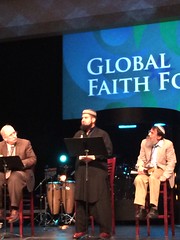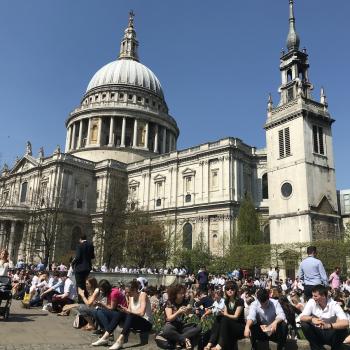I am here in Texas, in the heart of the Bible Belt. I have met here not just one Muslim, Christian and Jew but a number, and I believe there are Buddhists here also. The speaker list is quite impressive.
I’ve already realized that this Global Faith Forum is going to be unlike any other event I have ever attended. I’ve had the pleasure of meeting some very interesting people already. These are just some of them:
- A Christian who is serving in Iraq to help in the provision of specialist healthcare.
- A man with the surname “Love” who works in conflict resolution
- A Rabbi and an Imam who seem to be good friends
- A Palestinian Arab Christian who is an Israeli citizen
- A guy who was part of the Microsoft One launch party before coming here!
 Talking with some of the presenter team about why we are all here, it was clear that we all had one thing in common: We are all friends of Bob. Apparently, when Bill Clinton was president, in Washington there was an acronym “FOB” as it seemed everyone was a “friend of Bill!” So jokingly we adapted that nickname among ourselves.
Talking with some of the presenter team about why we are all here, it was clear that we all had one thing in common: We are all friends of Bob. Apparently, when Bill Clinton was president, in Washington there was an acronym “FOB” as it seemed everyone was a “friend of Bill!” So jokingly we adapted that nickname among ourselves.
The conference began, not with worship, as this is not an eccumenical “lowest common denominator” type of gathering. But the church’s worship band did play a Texas tune.
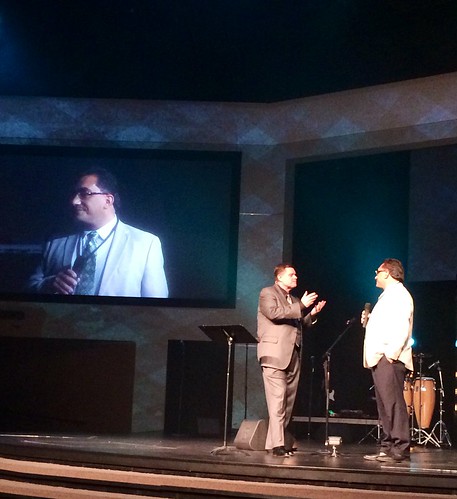
Bob then interviewed Jack Sara who described his experiences growing up as a Palestinian Arab Christian, with an Israeli citizenship. He explained that for him he had many friends who were Muslims, Christians, and Jews. He described how actually he had experienced good relationships. He did say one specific thing which I thought was very interesting. He said that he and his friends growing up just didn’t talk about their faiths. I can certainly see why that may have been a very wise approach in Israel and Palestine. But it seems to me that being together without a war starting is one step. The next step is us being able to actually talk about our faith. In a sense that is what Patheos is all about with our motto here “hosting the conversation on faith.”
I explained why I joined Patheos in my first post here: “Entering the Marketplace of ideas.” It was really because I wanted to be a part of this global public square that is emerging here. We are all in the same place, a cacophony of voices from almost every imaginable religious background and none. Like Jack and his friends growing up, we don’t kill each other here. In fact, most of us even have very cordial comments sections. Our material is curated and here on this one domain you can read the perspectives of emerging voices from many different faith groups. Also, slowly but surely, I believe we are taking steps towards actually interacting with each other, and doing so in a civil way. Accordingly I want to invite Patheos bloggers to follow along as I blog this conference and chime in on their pages, whatever their background.
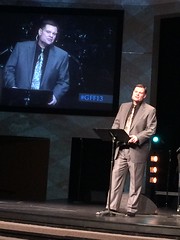 Bob Roberts then gave a brief introduction to the principles he wants the conference to be built on. A fuller introduction to these ideas can be found at Bob Roberts’ Address at the 10th Anniversary of the Doha International Center for Interfaith Dialogue:
Bob Roberts then gave a brief introduction to the principles he wants the conference to be built on. A fuller introduction to these ideas can be found at Bob Roberts’ Address at the 10th Anniversary of the Doha International Center for Interfaith Dialogue:
- Multifaith: We are all people of faith and yet we shouldn’t have to compromise my faith to be friends. We can be conservative in our faith and still get along. Most people who actually believe their own religion do not want to pretend like we all agree, or simply agree to not mention the things we have very different perspectives on.
- One Conversation: The whole world is listening. What we say, and how it comes across is vital. The way we say things might sound really good to our tribe, but not to those listing. Truth doesn’t have to sound arrogant and hateful. If you believe that your truth is from God it doesn’t have to make you arrogant.
- Public Square: We must be respectful of one another. Faith in society represents the character, spirituality, conscience of a society and builds conviction. Religious freedom is vital. Bob repeatedly said that he wants the whole world to follow Jesus. But I don’t want them to follow him because they are coerced. He believes that any form of intimidation of other faiths shows weakness.
- Engage the community in all its domains. There is much need for us to work together to improve the global and local communities in which we now live.
He rallied us to go beyond our own tribal mentalities and meet and make friends with people who aren’t like us. He told us not to be locked into only talking with people who think like us and speak like us. We should get outside the walls.
We then began to focus on the subject of war from a religious perspective.
First up Rabbi Hanan Schelsinger spoke from a Jewish perspective
What does Judaism teach about war. Jewishness is not only a religion but a family. But we are all human beings so we should share the pain and anguish of all victims of war. All human beings according to Judaism are created in God’s image. God feeds the hungry, clothes the naked, and heals the sick. Jews are commanded to do the same as God to all. Jews are reminded that they were once slaves in Egypt and should therefore be sympathetic to others. There is another side of the coin. The poor of your own city comes first. So those in the Jewish family require a priority of care. There is an argument that says when the command comes to love your “neighbour,” this is restricted to fellow Jews. Some rabbinical authorities argue that even the “alien and stranger” are restricted to those who have converted to Judaism. The isolationist position has also pointed to the idea that as in the past nobody cared for the Jews so they have to look after themselves. Others say that Jews should not stand idly by when someone else is the one suffering. Official Israeli policy is to allow the Syrians who are injured into Israel for treatment. The Rabbi really made the point that you cannot consider Jewish thought on war without considering the Holocaust. He also explained honestly that there are very different perspectives among Jewish people.
Next up was Iman Zia Ul Haque Sheikh with the Islamic viewpoint:
The world always says “never again” after every war. As we become more educated and supposedly more tolerant we should be becoming more committed to peace. Yet there are always wars, and there are always two sides to the warring parties. Many times Islam is painted as a cause of warfare. But there are verses in the Quran that talk about the need to fight to help the oppressed and persecuted. It was also suggested that those who are oppressing are workers for Satan. The Quran allows for people of faith to defend their churches synagogues or mosques. Defense of ones religion is encouraged. The victorious party is to establish prayer and order people to do good, not to plunder. Fighting for God with the intention that the word of God should become supreme. Fighting oppression, or defending religion. Any other will be not justified. Some people take verses out of context and say the Quran promotes violence. However, these verses are always followed with verses promoting treaties and hence peace.
Next, Dr Doug Skinner presented a Christian perspective:
Christians have a dilemma when the drumbeats of war sound. We hail Christ as the prince of peace. But we remember how Jesus warned that wars and rumors of wars would continue until he came again. Loving your enemies seems to be implying pacifism. But He also told us to follow the governing authorities. And we are told that the state doesn’t bear the sword in vain. There are therefore competing commands from Christ. Most Christians have some version of the just war theory. Loving our neighbors can be a reason to fight a war. Would the Good Samaritan have intervened if he arrived a few minutes earlier? If a war is just then the participation of a Christian is deemed morally warranted. But you participate in it a way that is governed by the love of God. We fight grievingly. There should be real regret and anguish. We should have a predisposition towards peace. There must be a refusal to dehumanize the enemy. Christians should treat combatants with dignity. There should be an overarching concern for the safety and welfare of non-combatants. There must also be a commitment to genuine reconciliation after the conflict. A Christian’s support of war is not supposed to be easy.
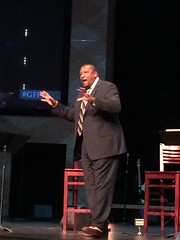 Finally, David Anderson gave a talk urging us to actually get to know people from different backgrounds He cited an African proverb which says, “from afar I thought it was a monster, when it got closer I thought it was just an animal, when it got closer still I realized he was a human, face to face I realized he was my brother.”
Finally, David Anderson gave a talk urging us to actually get to know people from different backgrounds He cited an African proverb which says, “from afar I thought it was a monster, when it got closer I thought it was just an animal, when it got closer still I realized he was a human, face to face I realized he was my brother.”
We tend to surround ourselves with people who are like us. Jesus engaged with people where they were. He found the place where people hung out and hung out with them. When you have comprehension through conversation you can have compassion.
If I demonize you I can kill you with a good conscience.
In conclusion of this post, I wanted to leave you with some posts from around Patheos on the subject of war from different religious perspectives:
- The Global Public Square Religious Freedom and the Making of a World Safe for Diversity (Patheos book club)
- Is Christian Just War Just Like Jihad?
- The Drone War
- Holocaust Remembrance Day and the Latino (Museum) Problem
- The Gentle Synergy of Believers
- Recommended reading on Islam
- What is Our Duty in Injustice?
- Is Christianity Peaceful? Is Peacefulness a Measure for Truthfulness?
Over to you: What does your faith group teach about war?



